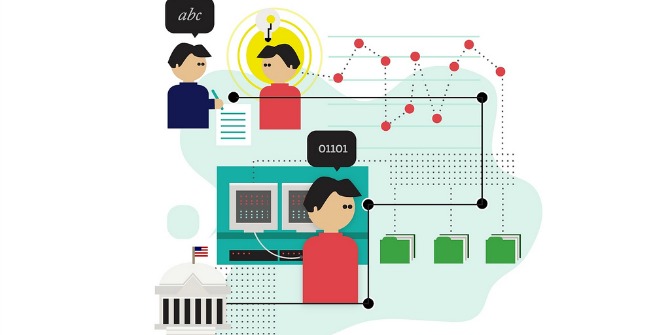 Recent research highlights the significant contribution that migrant mothers make to UK society. Dr Umut Erel from the Open University looks at how theatre was used as a strategy to co-produce this research. The workshops and resulting research findings demonstrate the value of two-way exchange between participants and researchers. The evidence suggests it is time to reframe the debate about migrant mothers away from questions of integration to engagement with citizenship.
Recent research highlights the significant contribution that migrant mothers make to UK society. Dr Umut Erel from the Open University looks at how theatre was used as a strategy to co-produce this research. The workshops and resulting research findings demonstrate the value of two-way exchange between participants and researchers. The evidence suggests it is time to reframe the debate about migrant mothers away from questions of integration to engagement with citizenship.
According to recent figures from the Office for National Statistics (ONS) more than one in five children born in England and Wales has a migrant mother. In 2014 188,000 children were born to mothers who were themselves non-UK born. They are, therefore, a significant and important group of women and, yet, very little evidence exists about these mothers who are bringing up future generations of UK citizens.
Often viewed as ‘needing to integrate’ themselves into the community, or positioned simply as ‘recipients of welfare’, migrant mothers are also portrayed as failing to provide their children with the sort of upbringing and guidance that will make them into ‘good citizens’ who themselves can go on and make a positive contribution to society. They, and the way they parent, are instead seen as a potential threat to social and cultural cohesion.
In opposition to this demonising narrative, our research, which we will be presenting in July at the ESRC Research Methods Festival, tells quite a different story. Through theatre-based workshops we were able to work with a group of migrant mothers from East London to ‘step on stage’ and share their own stories and experiences about what it means to belong, participate in and claim rights where they live.
We have found that migrant mothers are highly proactive in finding a place for themselves and their children in a society in spite of this unwelcoming environment. Perhaps more importantly, it shows that migrant mothers do in fact make a significant contribution to UK society, particularly when it comes to caring for and supporting people not just in their own communities, but across ethnic backgrounds.

The mothers shared their experiences of looking after the children of neighbours while they went to work. Others looked after their grandchildren to enable their children to go to college in the evenings. There were numerous stories of mothers offering support of this kind, not only to family members but to other members of their community across different ethnic groups. This, in many cases, was helping other migrant mothers to study or take a job.
Many of the women we spoke to did voluntary work, either in a formal but more often in an informal capacity: helping out at the children’s schools, sometimes helping newcomer parents to find their way around the education system, sometimes in specific charities, e.g. for carers or parents or focusing on health issues.
In this way, we saw mothers really ‘modelling’ engagement with the wider community to their children, leading by example when it came to participating in the community, actively supporting its members in their own efforts to integrate and actively shape the society they live in.
One of the main problems migrant mothers face is that the very negative representations of them as a group go mostly unchecked, getting taken as statements of fact with little or no evidence to substantiate them. One reason for this, we think, is that there is no clear framework for understanding the role of migrant mothers in making future citizens. It is completely missing from the public debate. And so the stereotypes are reinforced and there is little or no room for discussion about any positive contribution they might make.
As well as helping to gather information for this research, the theatre workshops we carried out were designed to give migrant mothers the opportunity to try out different strategies for dealing with conflict in the family, community or job centre, for example if and when they are being denied access to services. At a very practical level, this level of engagement led to insights for practitioners and policymakers working in this area to better understand what works in this context.
To get the best out of the research, we collaborated with expert theatre professionals and facilitators and a film maker. Our participants told us about what it meant to them to be a mother in London, the joys and the challenges and these stories were then ‘played back’ to them in the form of short sketches by a group of actors. Some of these experiences were very painful, but nevertheless a very positive and empowering experience.
One mother said: “It was good to step out of the silence and share these experiences and to help others who might want to step out of the silence themselves.” So in this respect our research did not just gather information from participants with a sort of ‘one-way interrogation’ approach in which the researcher ‘shines the spotlight’ on the participant. It was more reflexive than that, allowing participants to learn from the research process too because they were able to go over and reflect on their ‘performances’ as well as those of the other participants and potentially revise their attitudes, beliefs and actions going forward.
Using theatre helped researchers and participants alike see things differently, because the experiences go beyond language, allowing us to see not just what is, but also what is possible. Researchers and participants in effect became ‘co-producers’ of this research in order to show more accurately what citizenship is and what it can be. The research has shown clearly that it is time to reframe the debate about migrant mothers away from questions of integration to engagement with citizenship.
We believe the research shows that policy makers and society more widely should listen more carefully to the evidence, change its view and engage more directly with this group of women, not just to get the real picture, but to respond proactively to it.
Migrant mothers caring for the future is research by Dr Umut Erel, Open University, Professor Tracey Reynolds, University of Greenwich and Erene Kaptani, funded by the AHRC. They are continuing to work on the uses of participatory theatre and walking methods with Prof. Maggie O’Neill, York University.
Note: This article gives the views of the author, and not the position of the LSE Impact blog, nor of the London School of Economics. Please review our Comments Policy if you have any concerns on posting a comment below.
Dr. Umut Erel is a Sociologist at the Open University, UK. She has widely published on migration, ethnicity, gender and class. She is interested in how these issues play out in practices of citizenship, differentiated along gender and ethnic lines. Currently she is exploring migrant women’s mothering practices as citizenship practices in their own right and with respect to shaping their children’s ethnic, cultural, political identities and modes of citizenship. She is Principal Investigator (with Prof. Maggie O’Neill, University of York and Prof. Tracey Reynolds, University of Greenwich) of PASAR – Participation Arts and Social Action in Research, funded by the ESRC investigating the potential of participatory theatre and walking as research methods for the social sciences.







